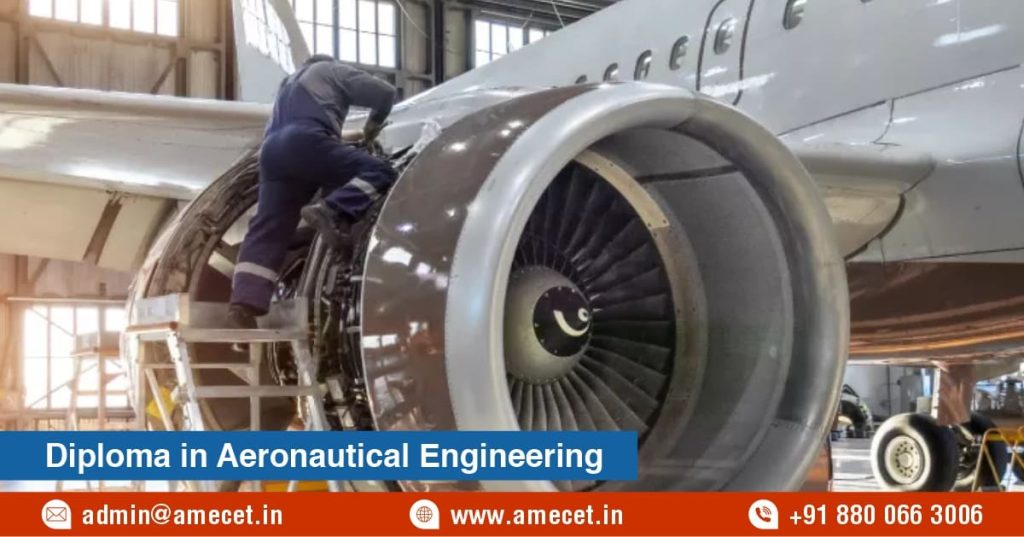Why Pursue a Diploma in Aeronautical Engineering?
Posted on : 21 August, 2024 3:12 pm
Pursuing a Diploma in Aeronautical Engineering offers a focused and practical pathway into the aviation industry. This diploma provides specialized training in aircraft design, aerodynamics, and maintenance, preparing students for immediate employment. With shorter program duration and lower costs compared to degrees, it allows for quicker entry into the workforce. The growing demand for aeronautical engineers ensures strong job prospects and career growth. Additionally, the diploma opens doors to further education and specialization, making it a strategic choice for those passionate about aviation and aerospace technology.
Page Contents
TogglePractical Training and Hands-On Experience
A Diploma in Aeronautical Engineering emphasizes practical training and hands-on experience, essential for mastering aircraft systems and engineering principles. Students engage in real-world projects, operate advanced simulation tools, and work directly with aircraft components. This approach ensures that graduates are not only knowledgeable but also skilled in applying their learning to solve practical problems, preparing them effectively for careers in the aviation industry.
Points:
- Real-World Projects: Involvement in actual engineering tasks.
- Simulation Tools: Use of advanced software and simulators.
- Aircraft Components: Hands-on work with real aircraft parts.
- Technical Workshops: Practical sessions in specialized labs.
- Industry Partnerships: Experience through collaborations with aviation companies.
- Maintenance Practices: Learning aircraft maintenance and repair techniques.
- Problem-Solving Exercises: Applying skills to real engineering challenges.
- Internships: Opportunities for work experience in the field.
Cost-Effective Education
A Diploma in Aeronautical Engineering offers a cost-effective education compared to a full degree program. With lower tuition fees and a shorter duration, students can save on educational expenses while still gaining essential skills for the aviation industry. This economical approach provides a solid return on investment by enabling graduates to enter the workforce sooner and start earning, making it a financially savvy choice for aspiring engineers.
Points:
- Lower Tuition Fees: More affordable than degree programs.
- Reduced Duration: Shorter program length reduces overall costs.
- Less Student Debt: Lower financial burden compared to long-term degrees.
- Quick ROI: Start earning sooner with quicker entry into the job market.
- Affordable Quality: High-quality training at a reduced price.
- Immediate Employment: Enter the workforce faster, benefiting financially.
- Cost Efficiency: Less time spent on education translates to lower costs.
- Value for Money: Solid education and career prospects at a lower price.
Career Opportunities
A Diploma in Aeronautical Engineering opens doors to diverse career opportunities in the aviation sector. Graduates can pursue roles such as aircraft maintenance engineers, aerospace technicians, or systems analysts. The diploma also provides a foundation for advanced positions in design and production or roles in aviation safety and quality control. The high demand for skilled professionals ensures a range of job prospects and career advancement opportunities.
Points:
- Aircraft Maintenance Engineer: Ensure the safety and functionality of aircraft.
- Aerospace Technician: Work on the technical aspects of aircraft systems.
- Systems Analyst: Analyze and improve aerospace systems.
- Aviation Safety Specialist: Oversee safety protocols and compliance.
- Production Engineer: Engage in aircraft manufacturing processes.
- Design Engineer: Contribute to the design of aerospace components.
- Quality Control Inspector: Ensure the quality and standards of aerospace products.
- Field Service Engineer: Provide on-site support and troubleshooting.
Global Opportunities
A Diploma in Aeronautical Engineering offers extensive global career opportunities due to the universal demand for skilled aviation professionals. The diploma’s recognition across international borders allows graduates to seek employment with global airlines, aerospace companies, and aviation authorities. With the growing global aviation market, this qualification provides access to diverse job markets and career advancements worldwide, enabling graduates to work and gain experience in various countries and cultures.
Points:
- International Airlines: Opportunities with major airlines globally.
- Aerospace Companies: Employment with leading international aerospace firms.
- Worldwide Recognition: Diploma recognized across different countries.
- Global Aviation Market: Access to a growing international industry.
- Diverse Work Environments: Experience in various countries and cultures.
- Cross-Border Employment: Flexibility to work in multiple locations.
- International Standards: Training meets global industry standards.
- Career Mobility: Enhanced prospects for working abroad.
Further Education and Specialization
A Diploma in Aeronautical Engineering provides a solid foundation for further education and specialization within the aviation industry. Graduates can pursue advanced diplomas or bachelor’s degrees to deepen their knowledge. They may also specialize in areas like aircraft design, avionics, or aerospace management. This pathway enhances career prospects and opens doors to advanced roles, research opportunities, and higher-level positions within the industry.
Points:
- Advanced Diplomas: Pursue higher-level diplomas for specialization.
- Bachelor’s Degrees: Continue education with a degree program.
- Specialization Areas: Focus on aircraft design, avionics, etc.
- Certifications: Obtain additional industry certifications.
- Research Opportunities: Engage in aerospace research projects.
- Management Roles: Move into higher management positions.
- Technical Expertise: Gain deeper technical knowledge in specific areas.
- Career Advancement: Increase qualifications for better job prospects.
In conclusion, a Diploma in Aeronautical Engineering offers a robust entry point into the aviation industry, with numerous benefits. The program’s cost-effectiveness, practical training, and global recognition provide a solid foundation for a rewarding career. Graduates benefit from diverse job opportunities, industry demand, and the potential for further education and specialization. The diploma not only prepares students for immediate employment but also sets the stage for ongoing professional development and international career prospects. Choosing this diploma is a strategic step towards a dynamic and fulfilling career in the ever-expanding world of aviation.

